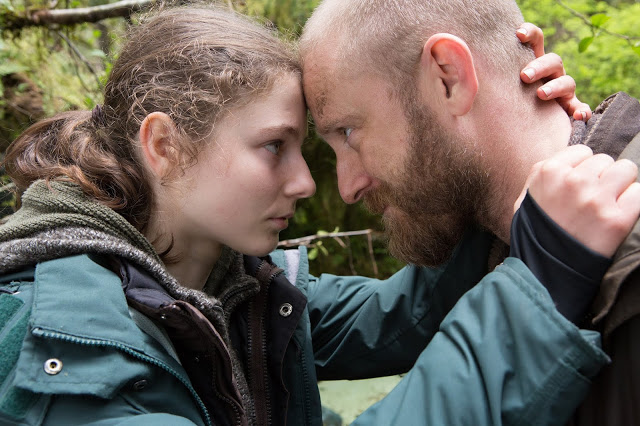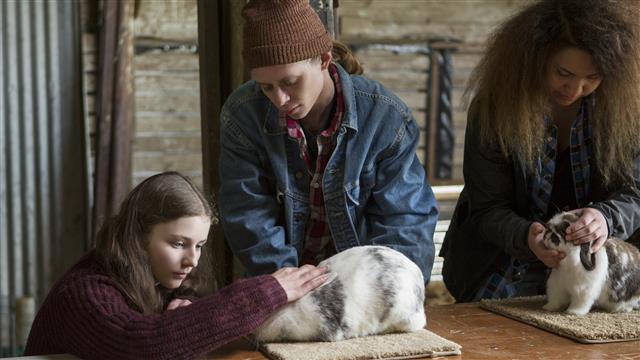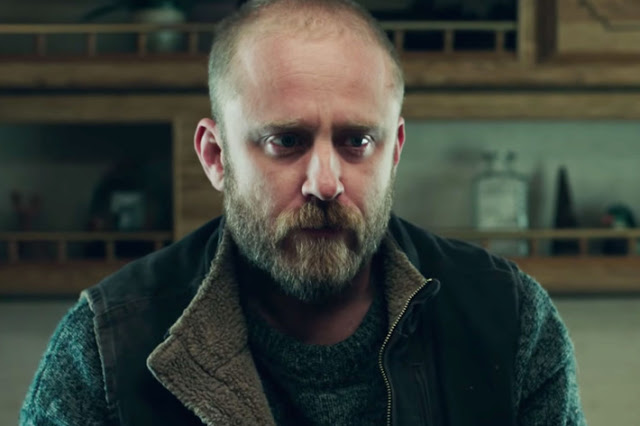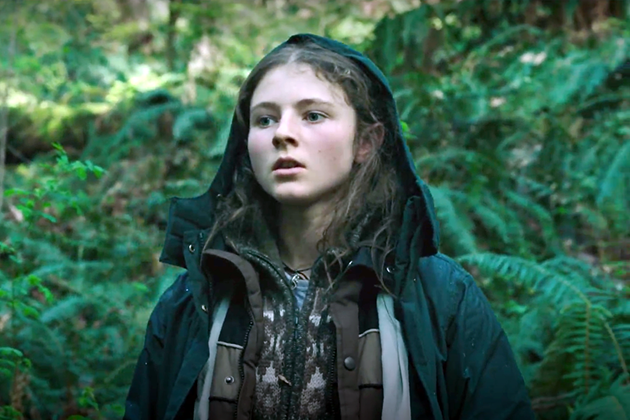Every night before they go to sleep, the 13-year-old girl and her father, nestled snugly in a cramped tent, say goodnight to each other without using words. Instead, they make a sort of clicking sound, bringing their tongues against the back of their front teeth, the type of noise one might use to summon a horse: “tchic-tchik.” In other contexts, it might sound silly; here, it’s an expression of sincere, absolute love.
To my recollection, nobody actually says “I love you” in Leave No Trace—the gentle, empathetic, quietly devastating new movie from Debra Granik—but the concept of devotion is nevertheless sewn into the film’s very fabric. It’s present in the relationship between the father, Will (Ben Foster, against type), and the girl, Tom (Thomasin Harcourt McKenzie, revelatory), who open the picture residing comfortably and illegally in the verdant woods outside Portland. It’s found in the respect that the two demonstrate for nature, with all its wonders and terrors. (The title derives from a popular conservationist ethos.) And it’s apparent in the warm regard that Granik displays for her characters, whom she treats with curiosity, tenderness, and honesty.
Which is not the same as judgment. Pitched at a soothing hum that camouflages its explosive undercurrents, Leave No Trace is careful not to oversimplify its examination of two people living on civilization’s fringes. It begins as a thoughtful appreciation of the natural world. Granik, whose prior film, Winter’s Bone, plunged into the Ozarks with unnerving intimacy, again displays a deft hand at highlighting the particulars of a given milieu. The opening scenes of Will and Tom peacefully gathering food and supplies, surrounded by the cheerful chirping of wildlife and the rustling of foliage, are rich in aural and visual detail. They make the outdoors feel lived-in.
But such beauty is ephemeral, and easily disturbed. Despite their best efforts to remain off the grid and cover their tracks, Will and Tom are eventually discovered by the local authorities. (When Tom protests that they’ve done nothing wrong, she’s informed by a social worker that it’s legal to be unhoused but illegal to live on public land; the film declines to remark on whether this is a patent contradiction.) Thus begins their forced reintegration into society, which involves the government placing them in a modest home, enrolling Tom in school, and finding Will steady employment.
The danger with a movie like Leave No Trace is that it risks creating false dichotomies: between nature and order, between fluidity and rigidity, between us and them. It’s a trap that Granik nimbly avoids. She acknowledges Will and Tom’s woodland happiness, but she does not embellish it, and as the film progresses, she proves frank and unsparing in revealing the perils that humans face when they push deeper into the great beyond. (Many young children ask their parents about the concept of death, but those questions tend to be speculative and existential; when Tom asks Will, “Am I going to freeze tonight?” there is nothing philosophical about her inquiry, just raw, cold, justifiable fear.) Similarly, while the screenplay, which Granik co-wrote with Anne Rosellini (adapting Peter Rock’s novel), recognizes that systematized American life carries with it an inherent gracelessness—Will is initially required to take a seemingly absurd true-false test with 435 questions of varying vagueness—it does not posit its governmental figures as callous interlopers or bloodless bureaucrats. And in refusing to romanticize her lead characters, Granik grants them nobility without saddling them with superiority.
This measured quality of self-awareness does not extend to Will, who perpetually regards anyone in his orbit other than Tom with suspicion, derision, or both. And the heartbreak of Leave No Trace lies in the gradually cracking schism between a loving father and the daughter he cares for unconditionally and desperately strives to protect. Tom adores Will, but while she has inherited his fierce intelligence and his affection for a spartan lifestyle, she does not share his deep mistrust of others.
And why should she? Everyone she meets in this movie—from the case worker who nudges her toward social interaction, to the trucker (with a dog named Willie Nelson) who gives her a lift, to the impresario of a small trailer park who shelters her from a figurative storm (and who’s played by Dale Dickey, probably still best known for her role as a ruthless matriarch in Winter’s Bone)—is kind and welcoming, a testament to Granik’s abiding humanism. And unlike Will, who remains scarred from unspecified military trauma (perhaps he served in the same backstory-averse unit as Joaquin Phoenix’s character from You Were Never Really Here), Tom proves adept at the intricacies of social engagement, befriending a pleasant boy who enters his fluffy rabbit in awards shows, as well as an elderly beekeeper who introduces her to the mysteries of the hive. This again places her in stark contrast with Will, whose unfortunate job placement of cutting down Christmas trees only exacerbates his view that society is the destructive enemy of nature.
It’s possible to judge Leave No Trace as slow; certainly, Granik is as interested in the rhythms of behavior as in the mechanics of plot. But the deliberate pacing builds to a powerful payoff. The movie’s third act, which finally reconciles the gnawing tension between Will’s restlessness and Tom’s openness, is haunting and sad, even if it feels, in retrospect, utterly inevitable.
And even if you chafe at the film’s leisurely tempo, you will not be able to deny the exquisiteness of its acting. As he reminded us with his electric turn in Hell or High Water, Foster is a naturally vivacious screen presence, but here he is astonishingly recessive, turning Will into a numb, hollowed-out shell of a man. Foster also has the humility to cede the spotlight to Harcourt McKenzie, who supplies a knockout performance that’s equal parts inveterate poise and guileless innocence. Her talent is beyond her years, in part for the way she makes Tom seem so terribly young. It’s easy to envision Harcourt McKenzie’s work here as the launching point of an illustrious career, just as Granik eight years ago provided the springboard for another gifted ingénue named Jennifer Lawrence.
Leave No Trace is a wonder, but lavishing praise on it almost feels inappropriate. It’s such a well-observed, gossamer movie that I don’t want to flatten it with ostentatious rhetoric. So maybe I should just take my cue from its characters. At the end of the day, all I really need to say to it is: tchic-tchik.
Jeremy Beck is the editor-in-chief of MovieManifesto. He watches more movies and television than he probably should.




